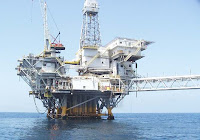 The off-shore drilling debate is heating up here in Virginia and it’s generating a good deal of posturing and over-heated rhetoric.
The off-shore drilling debate is heating up here in Virginia and it’s generating a good deal of posturing and over-heated rhetoric.
The posturing comes from General Assembly Republicans, who introduced a bill during the special transportation session that would have allocated a share of the state’s royalties to help pay for new transportation projects. Wow, that’ll be a big help… 12 years from now! The regulatory hurdles to exploration and drilling will delay exploitation of oil and gas reserves off the Virginia coast for years, and energy companies are more likely to chase more lucrative opportunities before investigating the Virginia coast.
The Washington Post quotes Stewart Glickman, an equity analyst at Standard & Poor’s: “There would probably be far more interested in the eastern Gulf of Mexico than they would be in the mid-Atlantic. [But] it is a possibility at some point.”
The over-heated rhetoric comes from the environmentalist camp. Some environmentalists oppose drilling under any circumstances, citing concerns about leaky pipelines, on-shore refineries, platform lights cluttering a pristine night sky and large-scale oil spills. Burning oil and gas, they add, contributes to climate change which could help raise sea levels and swamp much of Hampton Roads and the Eastern Shore.
No one wants oil spills, and with oil likely to sell above $100 per barrel more or less forever, oil companies could afford to deploy whatever safeguards are needed to reduce the potential for oil spills to near zero. Someone ought to take a visit to the oil rigs in the Gulf of Mexico and ask how much oil spilled during Hurricane Katrina… or ask how much oil spills ever. If the safeguards aren’t sufficient to protect Virginia’s pristine coast, then I agree, let’s wait until we can guarantee that the waters will remain clean. But rather than assuming that offshore oil wells pose a big risk, let’s ascertain the facts.
One argument against drilling seems especially disingenuous: Getting a few hundred thousand barrels per day from Atlantic Coast oil wells won’t make a dent on oil prices. We can’t extract enough oil, the argument goes, to impact global supply and demand. Well, that’s true… but it’s irrelevant. Pumping 25,000 barrels a day (to pick a number) from Virginia’s continental shelf would allow us to avoid buying 25,000 barrels a day of someone else’s oil. At $100 per barrel, that’s $2.5 million a day that’s being circulated in the United States economy, much of it in Virginia, not shipped overseas to support foreign despots. That would be a good thing.
None of this logic obviates the need for a restructuring of transportation systems and human settlement patterns into more energy-efficient forms. Exploiting off-shore oil and gas can pump some money into the state’s economy but it won’t come close to meeting our long-term energy needs.
(Photo credit of California oil rig: Solar Cola.)


